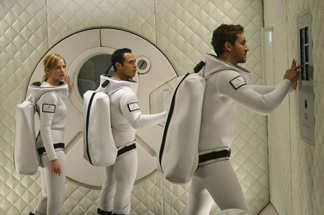Mythology
By Martin Felipe
July 9, 2009
BoxOfficeProphets.com

And of course, a campaign has begun to save Virtuality. Ratings for it were awful, but over the past decade or so, this has become a less important thing. Don't misunderstand me, networks still want to make money, and the ratings point is still the number one factor in achieving profitability, but the days of the mass television phenomenon are behind us, and networks are taking more and more chances with low rated quality product.
Of course, a trend started in the '90s towards demographic programming. Surprise, surprise, networks discovered that younger folks like to spend money. So when a show like Buffy the Vampire Slayer comes along and gets decent, but not stellar ratings, the fact that it enjoyed passionate viewing from the desirable demo and glowing reviews helped it survive for seven seasons.
But I think it was more the advent of The Sopranos and other HBO programming that really sent the networks reeling. Of course many of their shows had huge ratings by HBO standards, but they wouldn't have lasted a month on the networks. Most of them enjoyed Buffy style glowing reviews and soon, HBO began to dominate the Emmys and other television awards.
This trend towards challenging, quality programming as opposed to formulaic, tried-and-true, ratings grabbing spread to other cable networks such as FX with The Shield, Showtime with Dexter and, recently, AMC with Mad Men and Breaking Bad.
Certainly these shows couldn't challenge the networks for ratings, but they were certainly stealing their thunder. The concept of the water cooler show was becoming an off-network thing, as more and more shows worth talking about were elsewhere. Meanwhile, the standard ratings model we all know continued to erode. The numbers weren't what they once were. Again, desirable demographics were keeping many of these programs alive when, in an earlier era, they'd have shuffled off the schedule with little or no fanfare.
The ratings were sucking, and the quality was elsewhere. What were the networks to do? Well, one thing is to nurture a well-reviewed little-viewed show. In the wake of the 9-11 attacks, Fox debuted a terrorist themed show called 24. It's hard to believe now that it's such a phenomenon and has even started to overstay its welcome, but 24 was on the verge of cancellation after season one. The reviews were stellar, the ratings, not so much. But, the powers gave it one more chance and, in season two, it worked. It's now an Emmy winner and a core staple of Fox's line up.
Another Fox show with almost preternaturally good reviews despite anemic numbers was Arrested Development. Some would argue that Fox didn't treat it well. I argue that Fox knew that it gave them a little prestige and gave it a longer life than it would have enjoyed five years earlier. In '95, say, its run might have been 13 episodes, in the early 2000s, it got to 53 and won some Emmys.
Then there's the second life granted to other Fox failures, Family Guy and Futurama. (Family Guy's quality is debatable, but Futurama's, not so much.) They were both mistreated in their first runs, both developed an audience post-cancellation, and both have risen from the dead to produce new episodes and direct to DVD movies. There's a niche market for adult themed animation, and in this new landscape, room for properties that once seemed like minor footnotes in television history to become cultural phenomena in their own right.
There are tons of recent examples of current shows which, once upon a time, would be dead, but are now well-reviewed, death defying critical darlings - The Office, Chuck, 30 Rock. One show, Jericho (not the most well reviewed, but not panned either), even pulled a Star Trek on us and came back for a few episodes to wrap up its storyline due to fan campaigning. Another, yes one more in a long list of critical darlings, Friday Night Lights has been able to not fear-the-reaper by sharing costs between NBC and Direct TV.
It's a brave new TV world, one where desirable demos allow networks to seek prestige by finding ways to keep struggling shows alive, profitable, and award winning. Yes, there are, and probably always will be, some more traditional offerings around to grab relatively large audiences, critical scorn, and to keep the fabled view of television as a vast cultural wasteland alive, but as long as these quality nuggets find ways to survive another day and, in some cases, evolve into hits, we viewers will be the benefactors. Now, let's see if we can find a way to get more episodes of Virtuality.